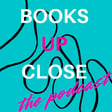
Ep. 5. Seán Hewitt, Open, Heaven
In this episode, we read the opening of Seán Hewitt's Open, Heaven (2025). Buy the novel from a local independent bookshop, or via Bookshop.org.
Seán Hewitt’s debut poetry collection, Tongues of Fire, received the Laurel Prize and was shortlisted for many awards, including the Sunday Times Young Writer of the Year Award. All Down Darkness Wide, his memoir, was shortlisted for Biography of the Year at the An Post Irish Book Awards and for the Foyles Non-Fiction Book of the Year, and he has collaborated with the artist Luke Edward Hall on 300,000 Kisses: Tales of Queer Love from the Ancient World. His second collection of poetry is Rapture’s Road. Hewitt lectures at Trinity College Dublin, and is a Fellow of the Royal Society of Literature. In 2022, he was awarded the Rooney Prize for Irish Literature. Open, Heaven (2025) is his first novel.
Find the transcript and more about the show on Substack. Follow the show on Instagram.
Please leave feedback here.
Produced, hosted, and edited by Chris Lloyd.
